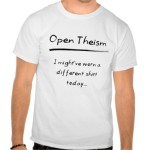We run our website the way we wished the whole internet worked: we provide high quality original content with no ads. We are funded solely by your direct support. Please consider supporting this project.
Why do you claim that everybody, whether they know it or not, believes that the future is partly open?
Whatever a person may theoretically believe, they act like the future is partly open. For, as a matter of fact, there’s no other way to act.
Think about it. Every time we deliberate between options on the way toward making a decision, we assume (and we have to assume) that a) the future consists of possibilities and b) that it is up to us to resolve these possibilities into one actuality (that is, our concrete decision). It’s simply impossible to deliberate in a way that manifests a different set of beliefs.
Go ahead and try it. Right now, think about a matter you need to resolve with a decision. Consider your possibilities and weigh your options. Now, try to do this without presupposing that these possibilities are genuinely real and genuinely up to you to resolve. You may consciously believe that the fact of what you’re going to decide has been “out there” for an eternity in the mind of God, but you can’t act on this belief as you deliberate. In fact, you act against this belief in your very act of deliberation.
What makes this interesting is that it’s something of a truism that we reflect our true convictions more by how we act than by what we say or even think (for our conscious minds are frequently deceived). If I truly believe my car is rigged to explode when I start it, for example, and if I truly believe life is worth living, then I will not get into my car and start it. If I profess these two beliefs and yet get into my car and start it, you’ll know that I’m either insincere or self-deceived in professing one or both of these beliefs. Our truest convictions are manifested not by what we say or even think, but by how we act.
From this it would seem to follow that everyone – including those who adamantly deny it – really believes the future is partly open. Just watch how they deliberate.
Here’s the irony. In the very act of deliberating about whether to embrace or reject the open view of the future, people presuppose the open view of the future is true.
The only remaining question, then, is whether they’ll get their theoretical beliefs about the nature of the future to line up with their core conviction about the nature of the future. .
Category: Q&A
Tags: Open Theism, Q&A
Topics: Free Will and the Future
Related Reading

What is the significance of Ezekiel 22:29–31?
The Lord says he “sought for” someone to stand in the breech for Israel “but I found none.” Hence Israel experienced the wrath of God. If everything that shall ever come to pass is eternally fixed in the divine mind, God would have foreknown that no one would respond to his call for a Moses-like…

Can Christians serve in the military?
Question: Jesus ministered to military people (e.g. a centurion) and didn’t tell them to leave their military post. So do you think Christians can serve in the military? I believe it’s a Christians duty is to serve their country, aid the wounded, defend the oppressed, protect our families, stand for truth and justice, and kill…

Loving a Twilight Zone God?
David D. Flowers posted this insightful reflection over on his blog about an episode of The Twilight Zone and what it says about some pop views of God. Can we really love a God that exercises this kind of random control just because he can? We can certainly fear a God like this, but can…

Podcast: Where Does Omniscience Fit In Within Open Theism?
Greg pontificates on what God knows. http://traffic.libsyn.com/askgregboyd/Episode_0280.mp3

What is the significance of 1 Chronicles 21:15?
“And God sent an angel to Jerusalem to destroy it; but when he was about to destroy it, the Lord took note and relented concerning the calamity; he said to the destroying angel, ‘Enough! Stay your hand.’” This powerful passage tells us why God sent the angel and why he changed his mind. If God…

